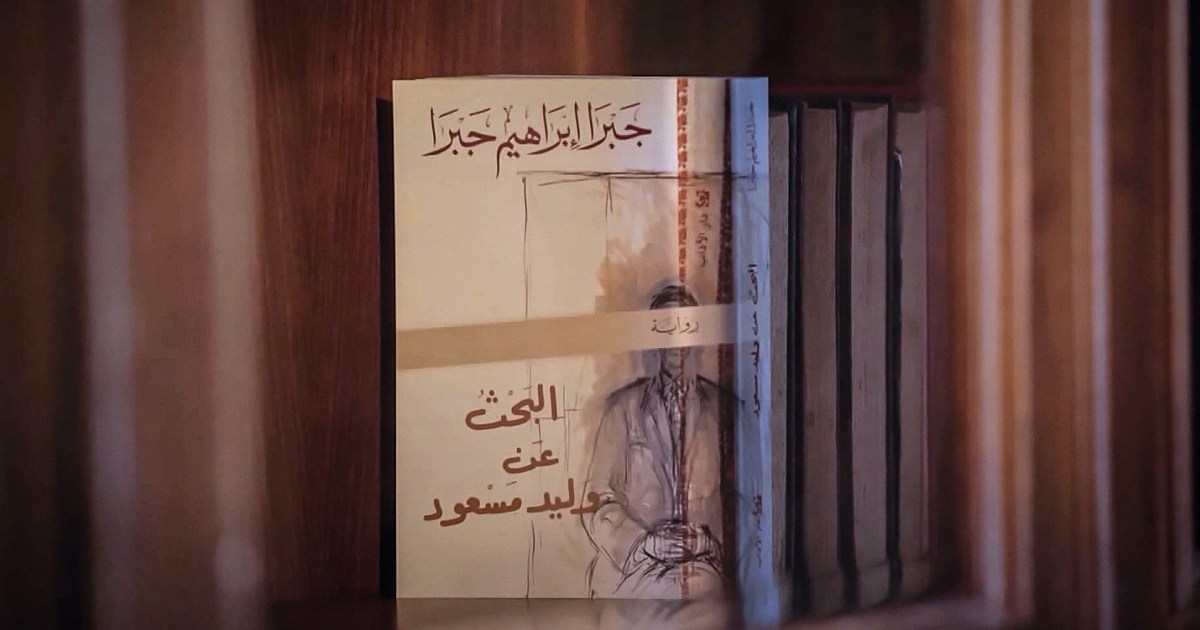Ibrahim Jabra published the novel "The Search for Walid Masoud" in 1978, which embodies, through its characters, a struggle that appears in the educated expatriate and its dispersal from his society and identity.
The hero's internal conflict appears through his alignment between his life, his romance, and his struggle cause, as the trilogy of love, resistance, and life seemed to be an indicator of the Palestinian's ability to continue.
The opinions of critics and writers who spoke to an episode of "Out of the Text" program (2021/12/19) differed about the content and message of the novel.
Samir Attia, director of "Palestine House of Poetry and Culture of Return" believes that the language in which it was written, the plots used by the writer, and the political contradictions in which he expressed are considered boldness and renewal on his part, but there is also a negative audacity contained in the novel.
While the poet Bassem Al-Madhoun considers that the novel is pivotal for Palestinian literature, and that Ibrahim Jabra did not speak from the Palestinian place, but spoke from another Arab country and from a state of diaspora and from a state of travel and absence.
In turn, writer Samer Radwan believes that the novel's specificity lies in the fact that it established a new understanding of the mechanisms of storytelling and modern construction that is related to the lived environment and the major questions of the Palestinian cause, noting that the writer benefited from Western schools.
In her own reading, the Jordanian writer Basma Al-Nesour confirms that the writer has surpassed almost all the taboos in his novel, which she classified among the classics of Arabic literature and that it influenced an entire generation.
The idea of the "hero legend"
The basic structure of the novel "The Search for Walid Masoud" is based on the idea of "the hero's legend" who disappears from a noisy, successful and lover life to achieve his personal return to Palestine, perhaps.
Some critics believe that the writer deliberately went overboard in glorifying this character to highlight the presence of the Palestinian cause in the Arab conscience, while other critics assert that he exaggerated this myth and that the Arab reader was more interested in issues of struggle in Palestinian literature.
According to the writer Samer Radwan, the Palestinian cause needed heroes, and this issue could not live in the popular conscience except through the manufacture of heroes, so Ibrahim Jabra exaggerated in downloading this character into what is unbearable.
Meanwhile, the director of Palestine House for Poetry and Return Culture says that the writer surprised the readers when he transferred "Walid Masoud" from a frivolous and deceitful character to a militant character.
woman picture
On the other hand, the image of women in Ibrahim Jabra’s texts provoked a lot of controversy, which appeared in the novel “The Search for Walid Masoud,” which was the subject of criticism for the writer, because the image of women carried many emotional and instinctive exaggerations, and in terms of the Palestinian woman’s personality in his works. She was almost absent.
The Jordanian writer praised the issue of the writer's treatment of women in his novel, noting that there was a fine and beautiful yarn, and that the Iraqi woman appeared, educated, free, and possessed of imagination.
It also took on the writer's influence on the Western societies in which he lived while studying, and he created an image that did not reflect the Baghdadi society from which he set out to build the characters and events of the novel.
Writer Samer Radwan summarizes the novel thus, "He used to say that I made a case for a person who disappeared and left a will, and perhaps this will will be lost as this person was lost," and adds that when you finish reading the novel, you wonder, "Does he really return?"
The Palestinian issue presents the same question: "Will it really return or will it really remain an issue?"

